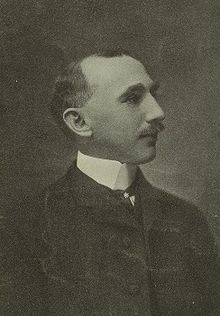 |
| Image Credit: Wikipedia |
Let's enjoy a bit of summer poetry with a nice cold glass of sweetened iced tea! Yep, we are doing it the southern way today. To kick off the month of July, we are presenting the poem Katydids And The Moon, by Madison Julius Cawein.
Madison Cawein (March 23, 1865 – December 8, 1914) was a poet from Louisville, Kentucky. He was the fifth child of William and Christiana (Stelsly) Cawein. His father made patent medicines from herbs. Thus as a child, Cawein became acquainted with and developed a love for local nature. His output was thirty-six books and 1,500 poems. His writing presented Kentucky scenes in a language echoing Percy Bysshe Shelley and John Keats. He soon earned the nickname the "Keats of Kentucky". He was popular enough that, by 1900, he told the Louisville Courier-Journal that his income from publishing poetry in magazines amounted to about $100 a month.
In 1913, a year before his death, Cawein published a poem called "Waste Land" in a Chicago magazine which included Ezra Pound as an editor. Scholars have identified this poem as an inspiration to T. S. Eliot's poem The Waste Land, published in 1922 and considered the birth of modernism in poetry. He died on December 8, 1914 and was buried in Cave Hill Cemetery. Please enjoy this summer poem by Madison Julius Cawein!
Katydids And The Moon
By Madison Julius Cawein
I.
Summer evenings, when it's warm,
In the yard we sit and swing:
And it's better than a farm,
Watching how the fireflies swarm,
Listening to the crickets sing,
And the katydids that cry,
"Katy did n't! Katy did!"
In the trees and flowers hid.
So I ask my father, "Why?
What's the thing she did n't do?"
For he told me that he knew:
"Katy did n't like to worry;
But she did so like to talk;
Gossip of herself and talk;
Katy did n't like to hurry;
But she did so like to walk;
Saunter by herself and walk.
How is that now for a story?"
II.
And one night when it was fine,
And the moon peeped through the trees;
And the scented jessamine vine
Swung its blossoms in the breeze,
Full of sleeping honeybees:
"That's Old Sister Moon," he said.
"She's a perfect simpleton;
Scared to death of Old Man Sun:
All day long she hides her head."
And I asked my father why,
And he made me this reply:
"Sister Moon's old eyes are weary;
Her old eyes are very weak;
Poor and old and worn and weak:
And the old Sun, with his cheery
Looks, just makes them leak and leak,
Like an old can leak and leak.
That's the reason why, my dearie."
Comments
Post a Comment